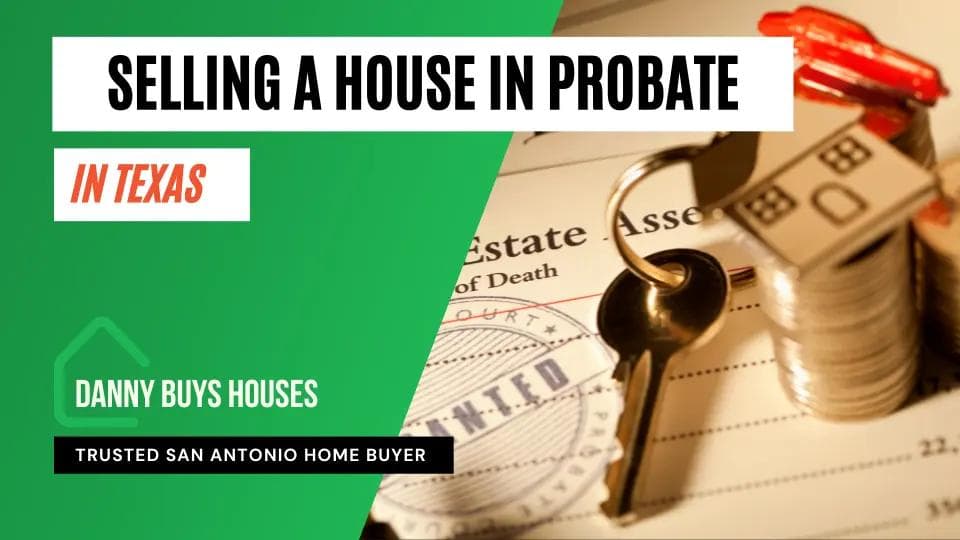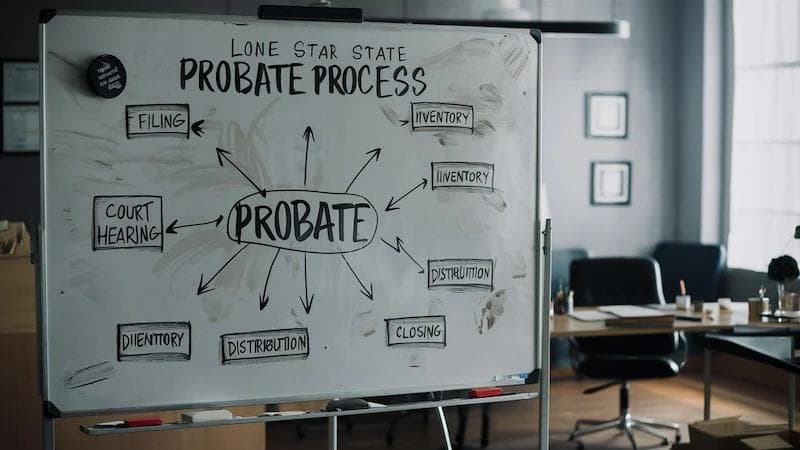
Selling a House in Probate in Texas
By Danny Johnson | Updated 12/5/2024, 2:30:00 PM
Selling a house in probate in Texas can be complex. Learn how the probate process works and what you need to know before you sell your property.
- Selling a House in Probate in Texas
- Key Takeaways
- Understanding Probate in Texas
- What is probate?
- The Texas probate court system
- Types of probate administration in Texas
- The Probate Process for Real Estate in Texas
- Legal Requirements for Selling a House in Probate
- Filing an Application for Probate
- Obtaining Court Approval
- The Role of the Executor or Administrator
- Preparing the Probate Property for Sale
- Selling a House in Probate in Texas: Step-by-Step Guide
- 1. Appraisal and Pricing Considerations
- 2. Marketing the Probate Property
- 3. Handling Offers and Negotiations
- 4. The Court Confirmation Process
- Costs Associated with Probate Real Estate Sales
- Alternatives to Traditional Probate Sales in Texas
- Muniment of Title
- Affidavit of Heirship
- Challenges and Potential Pitfalls in Probate Sales
- Working with Professionals During the Probate Sale Process
- Probate Attorneys
- Specialized Real Estate Agents
- Title Companies
- Final Thoughts and An Easy Way To Sell Fast
🗂 Table of Contents
Selling a House in Probate in Texas
Losing a loved one is always hard. You have all of the memories that come back when you visit the house. Selling the home after they pass is often difficult but necessary. This task mixes sad memories with tough legal steps. If you're in this journey too, you're not alone. This guide is here to explain the Texas probate process and how to go about selling the house during probate. You'll be able to move forward with more ease.

Getting through the process in Texas is not always simple. You need to know the rules, work with an executor or executrix (or be the executor or executrix), and all the ins and outs of inheritance when you go to sell the property. Yet, with the right help and info, you can make it through. Let’s dive into how probate sales work in Texas.
Key Takeaways
- Probate in Texas involves specific legal procedures for selling inherited property
- The executor plays a crucial role in managing the estate and property sale
- Court approval is often required before finalizing a probate real estate transaction
- Understanding Texas estate law is essential for a smooth probate process
- Working with experienced professionals makes it easier navigate probate property sales
- Proper preparation and pricing are key to successfully selling a probate house fast
Understanding Probate in Texas
Probate in Texas is how a person's estate is handled after they pass away. Through this legal process, their assets are fairly shared out and their debts are paid. Here, we'll explore what probate means in the Lone Star State.
What is probate?
Probate is a court process. It checks a will if there is one, or manages the estate's affairs if there isn't. This includes finding all the assets, paying off any debts, and then giving what remains of the estate to the rightful heirs. In Texas, this can last from 6 months to 2 years, depending on how complicated the estate is.

The Texas probate court system
In Texas, there are 18 special probate courts and 254 county clerks to help. They make sure estate issues are handled efficiently. This setup ensures probate cases get addressed properly all over the state.
Types of probate administration in Texas
Two main types of administration are outlined in the Texas probate code:
- Independent Administration: This process needs less court checking, so it's quicker and cheaper.
- Dependent Administration: More court supervision is involved here. It is used for more complicated situations or when there are disagreements between the heirs.
When someone passes away without a will, the court picks an administrator (who becomes the executor of the estate). In this case, you can sell a house without probate. It's the executor's job to follow Texas laws and settle the estate. Knowing about these processes is key to understanding the intricacies of estate settlements in Texas.
The Probate Process for Real Estate in Texas

The probate process for real property in Texas is quite involved. It starts with filing an application and notifying everyone. Then, a court hearing sees the judge review the will and pick an executor.
The person assigned as the executor has several key tasks:
- Creating a list of all the assets in the estate
- Figuring out who the legal heirs are
- Dealing with the estate's debts and people it owes
- Solving any legal issues that come up
A will makes things easier, but getting court approval is still needed for the real estate. The probate journey can take several months to over a year. Challenges or disagreements typically make it last longer.
"Probate in Texas can be a lengthy process, especially when it involves valuable real estate. Patience and proper legal guidance are key."
The court keeps a close eye on how the estate is being managed. This is to ensure everything is fairly done and everyone's interests are protected. Once debts and issues are sorted, the court finally allows the transfer of the real property to the approved heirs or beneficiaries. Many times, the heirs will want to sell an inherited house and split the proceeds. This is when selling a house during probate comes into play.
Legal Requirements for Selling a House in Probate
Selling a house in probate in Texas comes with certain legal steps. First, you file for probate with the county clerk. Then, the executor carries out their duties. Now, let's look at these steps closely.
Filing an Application for Probate
The initial step is to submit a probate application. This goes to the county clerk. It marks the start of handling the estate. In it, you list the deceased's assets and who might inherit. The court must approve this before things move forward.

Obtaining Court Approval
After filing, you need the court's OK to sell a probate house, even with a will. The executor must explain the sale in court. This ensures the estate and its beneficiaries benefit from the sale. The judge checks the sale terms to approve it.
The Role of the Executor or Administrator
In the probate, the executor plays a key role. They're in charge of tasks like:
- Creating an itemized list of what the estate owns
- Telling any creditors that the estate is being managed
- Overseeing the estate's property
- Getting court approval to sell the house
By handling these responsibilities, the executor can make the probate process run smoothly. It also helps to protect everyone's interests. Knowing these legal steps is vital for a successful probate sale in Texas.
Preparing the Probate Property for Sale
Putting a probate property up for sale is a big task. The executor's main job is maintaining the property well. This means looking after the yard, fixing what's broken, and keeping things tidy.
Fixing things can cost a lot. It's wise to figure out what needs to be repaired. Get different quotes. Focus on fixing issues that will make the property worth more or are safety concerns, especially if you choose to sell.
If you make the house look nice, more people might want to buy it. Take out personal stuff and reduce clutter. Maybe pay a pro to make your property look its best with a fresh coat of paint.
- Clean and declutter the entire house
- Make necessary repairs
- Improve curb appeal with landscaping
- Stage rooms to highlight their potential
Knowing how much your property is worth is key. Probate savvy real estate agents can help here. They offer info on how much similar homes are selling for. This way, the property can be listed at a fair price that also helps grow the estate's value.
"A well-prepared probate property can sell faster and for a better price, benefiting all heirs involved in the estate."
If you choose to list the property, taking the time to get it market ready with truly help with the house sale. Don't forget, the money spent on getting your property ready can usually be paid back by the estate. Always keep track of what you spend. This can be helpful for paperwork later on.
Selling a House in Probate in Texas: Step-by-Step Guide
In Texas, selling a house in probate has a unique process. We'll guide you through each essential step. This makes the journey less difficult to follow.
1. Appraisal and Pricing Considerations
Getting a house appraised is very important for probate sales. The court needs this to set a fair price. The final selling price in Texas should be determined by a real estate professional. This protects the estate's interests. People that buy houses can help with a cash offer if the house is in disrepair and the estate is unwilling to fix it up.
2. Marketing the Probate Property
To reach potential buyers, marketing the property well is crucial. Put it on various platforms, showcasing what makes it special. Also, hosting open houses can draw in more people. Make sure buyers know about the house's probate status.
3. Handling Offers and Negotiations
Negotiating offers for probate homes is different. The executor will assess and bargain over offers, keeping the estate's best interests in mind.
Hot Tip: When you sell the probate house and receive an offer, always negotiate it.
"There are very few people who will give you their highest and best offer right out of the gate."
4. The Court Confirmation Process
Court approval is the last probate selling step.
"The court confirmation process ensures fairness and maximizes the estate's value in probate sales."
Knowing these steps makes selling a probate house in Texas easier. Remember, it's a special process that needs careful attention and patience.
Costs Associated with Probate Real Estate Sales
When you sell a house in probate, there are many costs to consider. In Texas, probate fees can be a significant amount. For a simple case, expect about $1,500. But for more complex situations, the cost could be much higher.
The fees for lawyers are a big part of probate costs. Depending on the estate's complexity, they might charge by the hour or a flat rate. This can range from a few thousand to tens of thousands of dollars.
Another big cost is the real estate agent's commission, if you choose to use a real estate agent. Agents take about 5-6% of the house's final sale price. For a $300,000 house, this could be $15,000-$18,000.
Don't forget about property holding costs. This includes things like mortgage payments, property taxes, and insurance. Plus, you'll need to pay for utilities, maintenance, and any needed repairs.
If the probate process drags on, these costs can really add up. So, it's important to consider all these expenses when deciding what to do with the property.
"Understanding the full scope of probate costs is essential for executors and beneficiaries to make informed decisions about the estate."
To squeeze the most value out of the estate for everyone, manage costs and move through probate efficiently.
Alternatives to Traditional Probate Sales in Texas
In Texas, there are ways to simplify the handling of estates. These methods can cut down on both the time and money involved. Explore two common approaches that make everything easier.
Muniment of Title
Muniment of Title simplifies probate for straightforward estates. It's best if no debts are outstanding. With this approach, properties can transfer fast, bypassing the need for an executor. A will must be in place for this to work. The court checks the will and orders the property handover.
Affidavit of Heirship
For cases without a will, there's the Affidavit of Heirship. It identifies the heirs and their share of the estate without a will. Family members and witnesses sign this document. Once filed, it proves who owns the estate.
- Faster than traditional probate
- Lower costs
- Simpler paperwork
These alternatives can quicken the estate transfer. But, they both require specific conditions. It's vital to see if you fit these probate options. Talking to a lawyer can guide you to the right choice for inheriting property.
Danny Buys Houses can assist you with the process of preparing an affidavit of heirship.
Challenges and Potential Pitfalls in Probate Sales
Selling a house in probate can be tough. Disputes often happen, bringing stress to everyone. Heirs might not agree, forcing them into long legal fights.
Troubles with the title can slow things down. Liens or unclear ownership can stop the sale. It's a must to fix these issues early on.
Dealing with debts is another roadblock. The estate has to pay off what's owed first. This can reduce how much money goes to the property sale.
- Unexpected creditors may come forward
- Debt resolution can be time-consuming
- Some claims may be contested
Deciding on the property's value can also cause problems. Heirs might not see eye to eye. Sometimes, the court asks for many appraisals, making things longer and more expensive.
"Navigating probate sales requires patience and expert guidance. Each case is unique, with its own set of challenges."
In Texas, will disputes can last up to two years. This long time frame can make it harder to sell. For estates over $1 million, getting special legal help is wise.
Good planning and knowing what to do can help a lot. If executors expect and handle issues well, they can make the sale smoother. This saves money and time in the end.
Working with Professionals During the Probate Sale Process
Selling a house in probate can be hard. That's why it's vital to work with experts. They'll help you through the steps, avoiding expensive errors.
Probate Attorneys
Probate lawyers are key during these sales. They know Texas probate laws well. A good one will guide you past legal obstacles. They'll help by:
- File necessary court documents
- Represent you in probate court
- Ensure all legal requirements are met
Specialized Real Estate Agents
Real estate agents with probate expertise are a big help. They understand how to market these properties and solve difficult issues. These agents can do:
- Price the property correctly
- Find qualified buyers
- Navigate the court confirmation process
Title Companies
Title companies also have a big part in probate sales. They offer title insurance and ensure the property's title is clear. A good one can:
- Uncover any liens or encumbrances
- Facilitate smooth closing processes
- Protect both buyer and seller interests
Remember, getting professional help is crucial in probate sales. With a strong team of experts, selling can be easier. Plus, you might get more value for the property.
Final Thoughts and An Easy Way To Sell Fast
Selling a house in probate in Texas is not easy. You have to follow many legal steps. These steps are important to pass on property smoothly.
Walking through Texas' real estate during probate needs expert help. Those in charge must make sure the home is well presented. They need to balance legal duties with getting the best sale for the property.
Good planning and the right choices can make things better. Understanding probate sales and working with pros helps. This way, sellers can meet their legal duties. Everyone benefits from a well-managed probate sale in Texas.
If you are considering selling a probate property (sold while in probate), Danny Buys Houses can help. We are a cash home buyer in Texas and would be willing to make an offer to buy the house as is. This way you can avoid the costly repairs and the accrued holding costs while they are being made. Fill out the form or give us a call today.
Frequently Asked Questions
In this section we will answer the most common questions to selling a house in probate
What is probate and how does it affect the sale of a house?
Probate is the legal process that occurs after someone dies, involving the validation of their will and distribution of assets. Selling a house in probate can be complex as it requires court approval and adherence to specific legal procedures.
Can you sell a probate house for cash?
Yes, you can sell a probate house for cash. Cash buyers often expedite the process since they do not require financing approval, which can make the transaction smoother within the constraints of probate regulations.
What complexities arise when selling a house in probate?
Complexities include obtaining court permissions, dealing with multiple heirs or beneficiaries, ensuring all debts are settled before disbursement to heirs, and possible disputes among interested parties which may delay or complicate the sale.
How long does it typically take to sell a house through probate?
The timeframe can vary significantly depending on state laws and individual circumstances, but it generally takes several months to over a year due to required court processes and potential delays from disputes or creditor claims.
Are there any advantages to selling a home during probate rather than waiting until its completed?
elling during probate can provide liquidity quickly if needed by heirs or to settle debts. It may also prevent further depreciation of property value or reduce ongoing maintenance costs associated with holding onto an unsold property.

AUTHOR
Danny Johnson
Owner and Founder at Danny Buys Houses
Danny Johnson is an experienced real estate investor who has been buying houses for cash since 2003. As owner of Danny Buys Houses, Danny's goal is to help homeowners sell their house fast, regardless of the situation, so they can move on with their life.
Danny has been featured in publications such as Forbes, Realtor.com, BiggerPockets, Yahoo Finance, US News, and more. He is also the author of the book 'Flipping Houses Exposed'.




